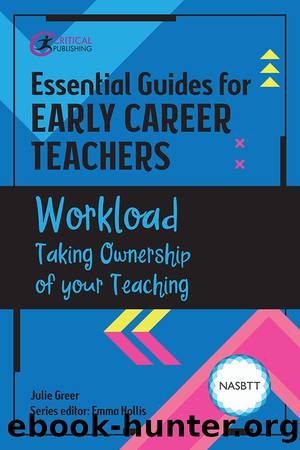Essential Guides for Early Career Teachers: Workload by Greer Julie;Hollis Emma;

Author:Greer, Julie;Hollis, Emma;
Language: eng
Format: epub
Publisher: Critical Publishing
Chapter 4âChoose your words
What? (The big idea)
The language of agency
From an early age, children are taught to do as they are told; to conform and to comply with adult direction. Fairy tales and childrenâs stories warn of the perils of independent thinking, curiosity and controlling behaviours. Think of Max in Where the Wild Things Are; consider Angry Arthur, or Alice in Wonderland. There are always exceptions to this rule, but even in books such as Matilda the heroine aspires to a gentle life of books and learning, far away from the successes of her free thinking which had enabled her to expose the abuses at home and at school. These stories add to the cacophony of messages that impact on cultural norms, affecting perceptions of gender, identity and diversity, for example. These messages, over time and through the discourse that follows, contribute to how you feel about your place in the world and your ability to make change.
Having agency in the decisions about your own life and in your own workplace is a good thing, but in the context of schools (which are managerially hierarchical) having a say can be seen as subversive, conflictual and unhelpful. Those who offer opinions that are contrary to the status quo are sometimes deemed âmeddlersâ, âtroubleâ or âbolshyâ. It would seem fair that if a school development plan had been agreed and a member of staff was constantly questioning the direction of travel, the practice and procedures of the school, in a way that was critical, personal or affected the quality of provision for the children in that teacherâs class, then a particular type of professional conversation would need to be held in which the teacherâs own approach and practice could be challenged. However, all too often in schools, critique is confused with criticism; questioning with subversion; making an argument with being argumentative; and discourse with dispute. The language of agency is so important and is intrinsically tied to emotional capital.
This chapter enables you to explore teacher agency and develop your thinking about forms of capital, so that you can be part of creating a more effective and collegial approach to policy, procedure and practice in education, particularly in relation to your workload.
Biesta et al (2015, p 624) describe teachersâ agency as âtheir active contribution to shaping their work and its conditions â for the overall quality of educationâ. They recognise that agency is not a property, capacity or competence, but something that people do. As a result, the quality of someoneâs agency is not down to the individual, but is dependent on the quality of their engagement with âtemporal â relational contexts-for-actionâ. Emirbayer and Mische (1998) proposed this phrase while defining agency in sociological and historical perspectives. It describes how your level of agency is affected by the past, present and future as you navigate between them in your considerations, actions and reflections; employing your ability to simultaneously hold your own views while considering the views of others and navigating overlapping needs and demands arising from the interplay with habit, imagination and judgement.
Download
This site does not store any files on its server. We only index and link to content provided by other sites. Please contact the content providers to delete copyright contents if any and email us, we'll remove relevant links or contents immediately.
Chicken Soup for the Soul Presents Teens Talkin' Faith by Jack Canfield(647)
Understanding PDA Autism in Kids: A Guide for Parents and Teachers to Support Neurodiverse Learners by Jehu Len(554)
The Victorian Era: A Captivating Guide to the Life of Queen Victoria and an Era in the History of the United Kingdom Known for Its Hierarchy-Based Social Order by Captivating History(422)
Brain Teasers to Build Critical Thinking Skills by Safarova Kris(411)
Brain Teasers to Build Critical Thinking Skills: Brain Exercises for Tech, Banking, Case Interview Prep, and to Keep Your Mind Sharp by Kris Safarova(411)
100 Ideas for Secondary Teachers: Engaging Parents by Janet Goodall & Kathryn Weston(386)
Python 101 - Fundamentals by Sam(373)
Critical Curriculum Leadership : A Framework for Progressive Education by Rose M. Ylimaki(363)
Writing Solid Code: Development Philosophies for Writing Bug-Free Programs by Steve Maguire(356)
The Art of Emotional Validation: Improve Your Communication Skills and Transform Your Relationships by Validating Emotions and Feelings by Emily Wright(339)
Intersectionality in Educational Research by Dannielle Joy Davis; James L. Olive; Rachelle J. Brunn-Bevel; Susan R. Jones(331)
The Knights Templar: An Enthralling History of the Rise and Fall of the Most Influential Catholic Military Order by Wellman Billy(329)
A Beginner's Guide to SSD Firmware by Unknown(327)
The Future Knowledge Compendium by Ellyard Peter;(319)
How to be assertive in any situation by Hadfield Sue & Hasson Gill(310)
Making Connections in and Through Arts-Based Educational Research by Hala Mreiwed Mindy R. Carter Sara Hashem Candace H. Blake-Amarante(305)
Foundations of Educational Research by Victoria Elliott(305)
What Every Teacher Should Know about Learning, Memory, and the Brain by Tileston Donna E. Walker;(305)
Message from the Pleiades; The Contact Notes of Eduard Billy Meier v1 only by unknow(301)
